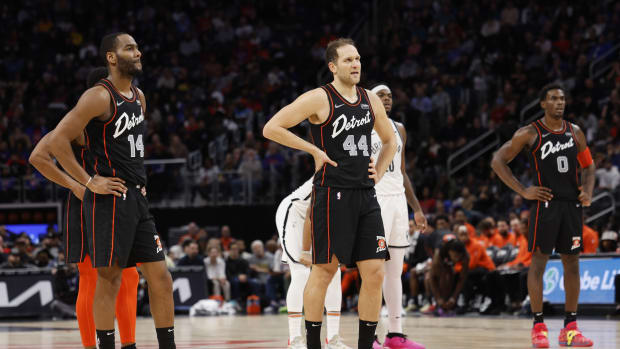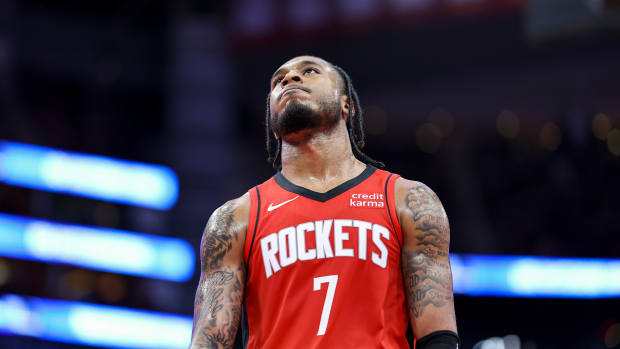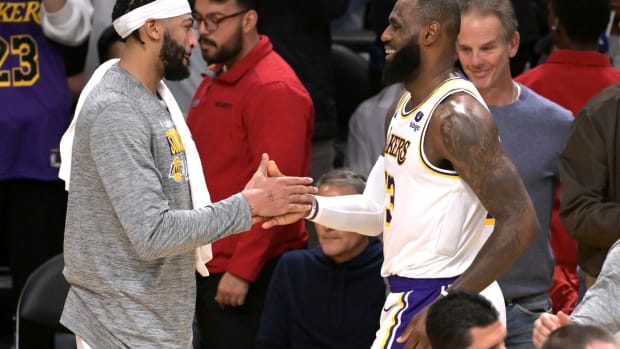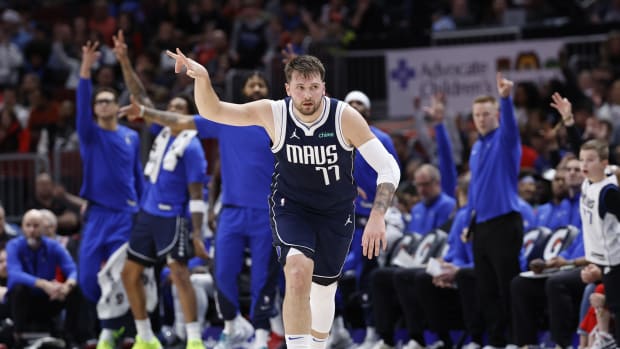It's Now or Never for George Hill and the Cavaliers
J.R. Smith committed a devastating and historic blunder earlier this week, the magnitude of which may one day define his entire NBA career. There are few graver sins on a basketball court than negligence of the moment. Smith was found guilty of it in crunch time of Game 1 of the NBA Finals, undercutting both the championship pursuits of the underdog Cavaliers and a truly marvelous individual performance from LeBron James.
Draymond Before Draymond: The Complicated Legacy of Dennis Rodman
The gutting, uncut video of the huddle that followed features Smith at its center, seen grappling with what he had just done. To his right, James—typically an unflappable sort—sits crestfallen. To Smith's left rests George Hill, partially obscured, his face in a towel. One of the small graces of Smith's mistake is the absolution it offered Hill. The way that Smith miscalculated was so strange and yet so clear that it gave cover. History might not even remember that Smith was only able to fritter away a crucial possession because Hill missed a go-ahead free throw. And it will surely be lost to time that, on a night when James needed only the slightest help to topple the Warriors, Hill couldn't even manage eight points of his own.
Smith is a known wild card, whose streaky play is accepted on face. Hill represents a different sort of variance: that between invisible and essential. The lows with Hill are never as low as with a player like Smith; Hill makes too few mistakes and too many subtle contributions to ever be a significant drag. Yet Cleveland can now share in the periodic frustration of Utah, Indiana, and San Antonio—all teams that have pushed for Hill to do more. Hill is the Cavs' second-best shot creator at this point and the only viable point guard on the roster. If he doesn't play well—and play serious minutes—Cleveland won't have much of a chance to extend this series.
Game 2, in which Hill scored 15 points on 12 shots, showed some promise in this regard. So often the issue with Hill has less to do with the moves he makes than the ones he doesn't. The instinct to reset the offense back to LeBron is rarely a bad one. Yet Cleveland faces a constant need to diversify its scoring—an even greater concern after the Warriors threw additional defenders at James in Game 2.
When Hill has the opportunity to attack bigs in one-on-one situations, it's good for the overall health of the offense that he take it. When Stephen Curry tries to show and recover back to Hill on Cleveland's 3–1 pick-and-rolls, it's vital that he exploit that recovery with quick, decisive moves. The Warriors prey on passivity. If they're allowed to defend Hill as if he were solely a spot-up shooter, Cleveland won't likely score enough to keep pace. Spacing is vital, but dynamic spacing is the only way to overcome defense of this quality.
Cleveland's interests—in terms of when to play Hill and with whom—are somewhat torn. On the one hand, Hill was brought to Cleveland explicitly to play with LeBron. Hill offers by far the most sensible means to get Curry—who will still switch when needed—matched up one-on-one against James. If it takes two or three screening attempts, so be it; Hill will screen and re-screen until Cleveland gets the mismatch it wants. From there, his threat is largely implicit. If the defense is ever tempted to leave Hill and double LeBron, it risks giving up prime scoring opportunities:
That he can offer a baseline of professional-grade execution, shooting, and defense makes Hill among the most valuable Cavs, which speaks volumes about the state of the roster. In the time he's shared with Hill in this series, LeBron has shot 60.6% from the floor, per NBA.com—in part because the trains run on time. When James has been forced to work without Hill (or rather, forced to work with Jordan Clarkson), he's shot just 48.6% from the field while turning the ball over more often than usual. (Both figures run in line with playoffs-long trends.) It's tempting to have Hill on the floor any time that James rests, and yet the Cavs' LeBron-centric offense relies on his facilitation.
It's possible Cleveland can have both. Hill has played just 65 minutes out of a possible 101 in the Finals to this point, despite their need to keep Clarkson's minutes to an absolute minimum. Not everyone can play 48 highly effective minutes the way LeBron can. Yet Hill's playing time has been somewhat suppressed by foul trouble. There's allowance within the rotation for Hill to buy LeBron a few minutes of rest, so long as he avoids picking up cheap fouls like this one:
If Hill can manage that, he could round out some of Cleveland's most vulnerable lineups without much cost to their best. The five-man grouping of Hill, Kyle Korver, Jeff Green, Kevin Love, and Larry Nance Jr. showed some spark in Game 1 and made out as a net positive. That could be worth exploring again—assuming James rests at all.
Even if Hill continues to play a quiet role the rest of the way, maximizing his minutes could make a meaningful difference. It's in the Cavs' best interest to excise Clarkson from the rotation entirely. Rodney Hood, it seems, could be in line for some of his minutes. Cedi Osman could stand to steal a few, allowing James to work as a de facto point guard. Hill is more than capable of mopping up the rest, and Cleveland would be all the better for it. The worst, most invisible version of Hill is still miles better than the hopeful chucking the Cavs are getting from Clarkson.
That would be true based on offense alone, but defense helps add to the distinction. Hill can at least compete against bigger Warriors in switch situations due to his length, and he gives Cleveland its best chance to hang with Curry as he runs off-ball routes:
The care to contest without fouling, the heady switch back to relieve Love, the fight to avoid putting Nance into a vulnerable position on the baseline—this is exactly what Cleveland needs. It's why Cavs GM Koby Altman, after trading for Hill at the deadline, described him as "battle tested." There are scenarios on both sides of the ball that Hill understands how to navigate by feel alone—even those involving tangible adjustment.
Some part of Hill will always default to caution. He plays a careful style by type, the kind that can't be easily unwound in the pressure cooker of the NBA Finals. Cleveland just doesn't have any better, more malleable options. No more could be reasonably expected of LeBron. Love is doing what he can from underneath the Warriors' crosshairs. Depending on Green to scale his play is a fool's errand. Korver has been taken out of the series and Smith is hard at work digging his own grave. It's now or never for Hill, or else when he returns to the Cavs next season, he may find a far younger team with much more modest ambitions.




































